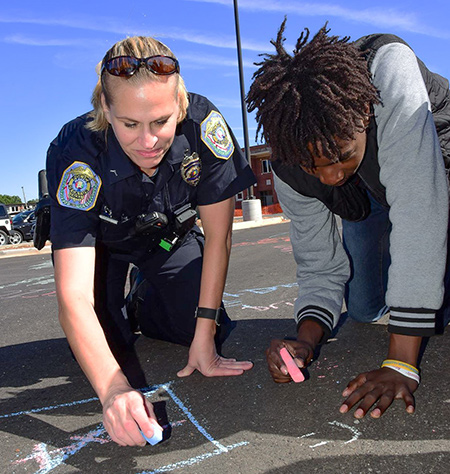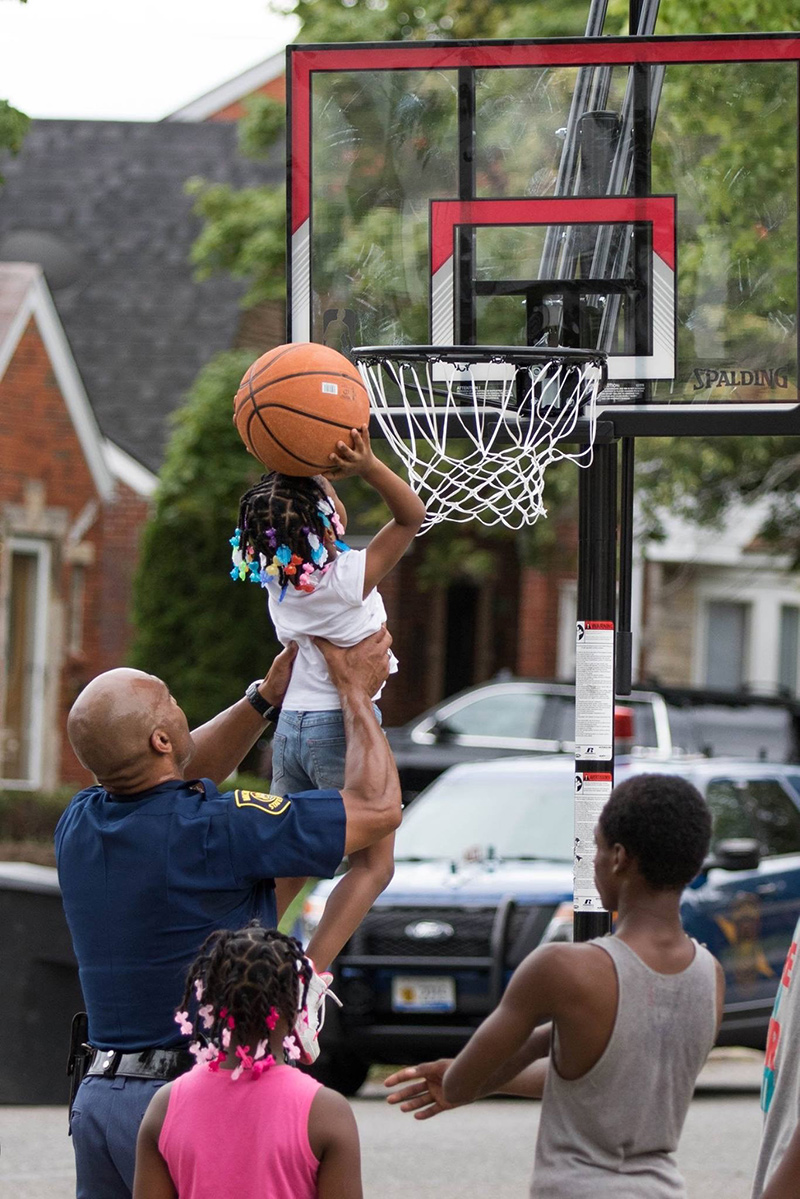Contact Us
To provide feedback on the Community Policing Dispatch, e-mail the editorial board at CPDispatch@usdoj.gov.
To obtain details on COPS Office programs, publications, and resources, contact the COPS Office Response Center at 800-421-6770 or AskCopsRC@usdoj.gov

U.S. Department of Justice
Office of Community Oriented Policing Services
Washington, DC 20530
 It wouldn’t come as news to anybody in law enforcement that many kids, especially those from disadvantaged communities, don’t trust cops. Or that young people who lack good role models and guidance make bad choices, sometimes leading to criminal behavior.
It wouldn’t come as news to anybody in law enforcement that many kids, especially those from disadvantaged communities, don’t trust cops. Or that young people who lack good role models and guidance make bad choices, sometimes leading to criminal behavior.
For this very reason, volunteers from police and sheriff’s departments across the country are stepping up to provide the role models and mentoring these young adults need, changing lives in many cases and improving public safety at the same time. Some of the programs they’ve developed are new to the field, and others have been around for a while, but all are replicable to one degree or another, and all have shown promise.
The COPS Office has been involved with many of these efforts, which range from summer camps to arts programs. Below are a sampling of those we have supported with grant funding, which may inspire other departments to create their own programs.
Coaching and Mentoring
Among the most widespread are the Police Athletics/Activities Leagues (PALs), which promote the prevention of juvenile crime by building relationships through engagement in sports, outdoor activities, education, and the arts, with activities ranging from football to cooking, lacrosse to leadership development. The National Association of Police Athletic Leagues (NPAL) will help train and provide technical assistance for agencies wishing to start new PAL programs, including a “How to Start a PAL Program’ toolkit and resources list funded by the COPS Office. You can read more about PAL in Five Reasons to Start a PAL Chapter in Your Community in this month’s Dispatch.
Another popular program is Badges for Baseball, created by the Cal Ripken Sr. Foundation with the support of the U.S. Department of Justice’s Office of Juvenile Justice and Delinquency Prevention. Badges for Baseball partners with law enforcement agencies, schools, and youth organizations to pair at-risk youth with mentors who use team sports to teach important life lessons and help kids build resilience, avoid drugs, and cope with other challenges.
The COPS Office also supports Dream Court™ sites and the programs they host. Founded by Basketball Hall of Famer Nancy Lieberman, the 65 Dream Courts across the country offer opportunities for officers to build relationships with young people through free play, tournaments, Special Olympics Day, and other activities that encourage team work and fair play. Reports from Dream Court sites say that school attendance has improved and youth involvement with criminal activity been reduced.
A fun program that reduces serious problems is Operation Recess, created with help from the Hopkins Minnesota Police Department (HPD) and funded by a grant from the COPS Office. Officers wearing program-branded tee shirts play with kids at recess, providing guidance and a feeling of safety to the schoolyard. Developed in response to studies indicating that many problems stem from incidents on the playground, the program promotes cooperative problem-solving behavior and bullying intervention techniques.
Developing Tribal Leaders
To foster a new generation of Native law enforcement leaders and strengthen bonds with young people in their community, the Nez Perce Tribe in Idaho collaborated with its tribal police department to create the Indian Youth Explorer’s Police Academy (IYEPA).
Funded with the support of a COPS Office microgrant, IYEPA is a sleep-away camp where young people, including non-Natives, learn police procedures, while also engaging in sports and other outdoor activities, including tipi building. Designed to encourage character development, physical fitness, good citizenship and patriotism, the IYEPA activities and classes incorporate many components of Police Academy training.
The Tribal Youth Police Academy (TYPA) of the National Criminal Justice Training Center of Fox Valley Technical College is a similar program, begun to encourage native youth to consider careers in law enforcement. In addition to police procedures and tribal law, the participants benefit from leadership development, public speaking practice, and confidence-building team exercises.
Acting Out to End Misunderstanding
Some children are better reached and motivated through art, drama, or music programs, which can provide a way to work out negative feelings in a safe manner, as well as a forum for discussion of important issues.
 The West Side Story Project (WSSP) is one such program. Begun as a collaborative effort by the Seattle Police Department (SPD), local schools, and Seattle’s 5th Avenue Theater, this program brings students together with police officers to see the film or play West Side Story and discuss the issues it dramatizes
The West Side Story Project (WSSP) is one such program. Begun as a collaborative effort by the Seattle Police Department (SPD), local schools, and Seattle’s 5th Avenue Theater, this program brings students together with police officers to see the film or play West Side Story and discuss the issues it dramatizes
The COPS Office–funded WSSP toolkit facilitates the program’s discussion groups, in which students and officers talk about the issues dramatized in the movie or play: youth violence, peer pressure, gangs, fitting in, youth-police relations, immigration, and racial and ethnic differences, among others.
Targeting Serious Problems
Other COPS supported programs target specific problems. Among them are the Allen County, Kentucky Sheriff’s Department’s Allen County Cares, Reducing Youth Opiate Use program.
A collaborative effort that includes the County Attorney, local schools, the Scottsville Faith Coalition, and other stakeholders, it educates children, teens and their families about the dangers of opioid and other substance abuse. Among the program’s activities are a three-day course for high school freshman about the consequences of alcohol and drug abuse, with presentations by law enforcement, project partners, and former substance abusers
To break the juvenile-detention-to-prison pipeline in their city, the Tacoma Washington Police Department’s (TPD) Juvenile Unit implemented the IF Project, named after the question “what if,” which haunts many individuals whose bad decisions led to jail. TPD’s IF Project brought schools, juvenile court, and mental health providers together with ex-offenders, young people, and their families to help these children get onto the right path. In addition to mentoring, at risk kids received needed social services, and officers helped their parents or guardians in efforts to strengthen family support. Since it began in 2012, 64 percent of the young people in the program have not offended or reoffended.
A unique program is STOP (Students Taking On Prevention) the Violence, a program that empowers young people with the skills and resources to reduce youth violence themselves. Begun by the Family, Career and Community Leaders of America (FCCLA) in partnership with the COPS Office, it’s a community-based training curriculum that teaches young people how to educate their peers about violence prevention, collaborate with school and community resources to address problems, and develop projects to reduce violence in their schools.
Benefitting the Kids, Officers, and Community
These is just a sampling of the many programs supported by the COPS Office. In addition to numerous others we have been involved with, there are successful programs sponsored by other government agencies.
All that build relationships of trust and provide guidance are of great value in helping our young people get onto the right path in life. In addition to saving them from the consequences of criminal behavior, these programs can go a long way toward reducing crime in the community.
Moreover, officers who participate say they enjoy the activities and get a good feeling from the bonds they develop with the young people. They also benefit by learning more about the home lives and challenges these kids face, resulting in a more compassionate and nuanced approach to them as a group.
Faye Elkins
Senior Technical Writer
For more information, see:
Subscribe to Email Updates
To sign up for monthly updates or to access your subscriber preferences, please enter your email address in the Subscribe box.






